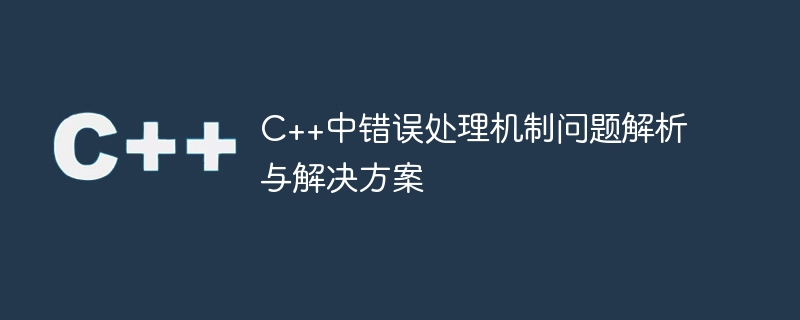

Analysis and solutions to the error handling mechanism in C
Introduction:
C is a powerful programming language, but the error handling mechanism is every Important issues that C programmers must face. When a program error occurs, unreasonable error handling mechanisms may cause the program to crash or cause unknown behavior. Therefore, this article will explore common error handling mechanism problems in C and provide solutions and specific code examples.
1. Reasonable use of exception handling mechanism
Exception handling is a common error handling mechanism in C. However, misuse of exception handling mechanisms may lead to performance degradation and program maintainability problems. The following are some common exception handling mechanism problems and their solutions:
Problem 1: Overuse of exception handling mechanism
Solution: Exception handling should be used to handle real exceptions, not for control process. When a function cannot be executed due to some error, an exception should be thrown. When the return value of a function can represent the normal execution result, the return value should be used instead of throwing an exception.
Sample code:
// 错误的使用异常处理机制示例
int divide(int a, int b) {
try {
if(b == 0) {
throw "除数不能为0";
}
return a / b;
} catch(const char* msg) {
std::cout << "发生异常:" << msg << std::endl;
throw;
}
}
// 正确的使用返回值处理机制示例
int divide(int a, int b) {
if(b == 0) {
throw std::invalid_argument("除数不能为0");
}
return a / b;
}Problem 2: Exception safety issue
Solution: Exception safety should be considered when writing code, that is, ensuring the integrity and integrity of the object when an exception occurs. Correctness. Exception safety can be achieved using RAII (Resource Acquisition Is Initialization) technology. By using STL objects such as smart pointers and container classes, automatic release of resources can be ensured.
Sample code:
// 异常安全性问题示例
void processFile(std::ifstream& file) {
std::string data;
// 读取文件内容
file >> data;
// 发生异常时,file对象没有被关闭
throw std::runtime_error("发生异常");
}
// 使用RAII技术实现异常安全性示例
void processFile(std::ifstream& file) {
std::string data;
// 使用智能指针管理文件对象
std::unique_ptr<std::ifstream> filePtr(&file, [](std::ifstream* ptr) {
if(ptr->is_open()) {
ptr->close();
}
delete ptr;
});
// 读取文件内容
*filePtr >> data;
// 发生异常时,file对象会被自动关闭
throw std::runtime_error("发生异常");
} 2. Error handling of memory management
Dynamic memory management is one of the common problems in C programming. The following are some common memory management problems and their solutions:
Problem 1: Memory leak
Solution: After allocating memory, you need to ensure that it is released in time. Memory leaks can be solved using smart pointers or manually freeing memory.
Sample code:
// 内存泄漏示例
void func() {
int* p = new int(1);
// 忘记释放内存
}
// 使用智能指针管理内存示例
void func() {
std::unique_ptr<int> p(new int(1));
}
// 手动释放内存示例
void func() {
int* p = new int(1);
// ...
delete p;
}
问题二:空指针引用
解决方案:在使用指针前,需要确保指针不为空。可以使用条件判断或者使用智能指针来避免空指针引用问题。
示例代码:// Null pointer reference example
void func(int* p) {
int value = *p; // p为空指针,会导致未定义行为
}
// Condition Example of judging to avoid null pointer reference problems
void func(int* p) {
if (p) {
int value = *p;
}}
// Example of using smart pointers to avoid null pointer reference problems
void func(std ::shared_ptr
int value = *p; // p为空指针,不会发生空指针引用
}
结论:
The above is the detailed content of Analysis and solutions to error handling mechanism problems in C++. For more information, please follow other related articles on the PHP Chinese website!




